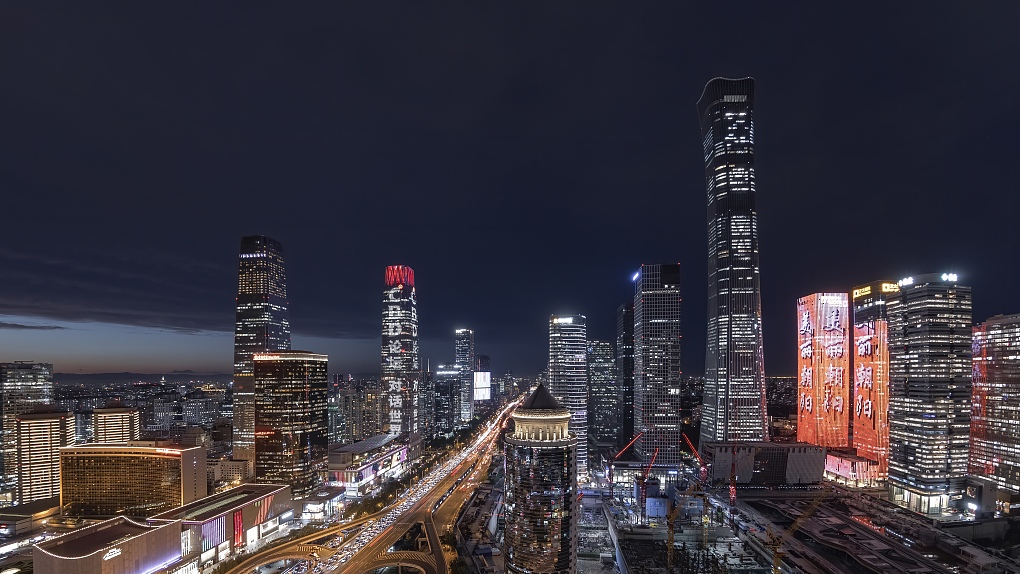
A light show of city buildings during the CBD Forum in Beijing, China, September 19, 2023. /CFP
A light show of city buildings during the CBD Forum in Beijing, China, September 19, 2023. /CFP
Editor's note: William Jones, a special commentator on current affairs for CGTN, is a former White House correspondent for Executive Intelligence Review. The article reflects the author's opinions, and not necessarily those of CGTN.
A recent article in the September-October 2023 edition of the Council on Foreign Relations (CFR) publication Foreign Affairs by Michael Beckley, associate professor of political science at the U.S.' Tufts University, entitled "Delusions of Detente: Why America and China Will be Enduring Rivals" makes the argument that "containment" is here to stay and will serve to preserve the peace by proving that the "liberal democratic order" is not going to disappear any time soon.
Beckley makes all kinds of irrelevant analogies with political developments over the last two centuries to make his point. The underlying argument is based on the general Western assumption that a rising China is working to solely determine the policies in the region and indeed in the world at large. If the "liberal order" is to survive, Beckley reasons, no compromise or "engagement" is possible, as it would be taken advantage of by the Chinese side.
What Beckley seems to ignore is that this "liberal economic order" is already becoming a false narrative and the failure of that "order" to bring prosperity to its citizens has created a major reaction even within the countries of that "liberal order" itself. Whether you look at the growing unrest in the United States or the declining economic status of major European countries like Germany, that "liberal order" is in a state of crisis not because of the "rise of China" but rather due to the economic folly of Western policy. The rise of the BRICS after its expansion has clearly shown the world that the countries of the Global South want another option rather than this present "liberal order," and are now gaining the economic prowess to have their voices heard.
The truth of the matter is that most of the countries of the world have benefited little from the "liberal world order." Conditions in most developing countries have gone from bad to worse as a result of the changing "terms of trade" in that liberal order. The rise of China and the Belt and Road Initiative has helped "kick-start" development in the stagnating economies in Asia, Africa and Latin America.
Unlike U.S. "aid" to developing countries, China does not require political requirements or "conditionality" as a prerequisite for its funding. And the success of China's poverty alleviation program, which Beckley tries to attribute to the fact of China entering the "world liberal order," would never have happened short of the determined commitment of the Communist Party of China (CPC) under Chinese President Xi Jinping, also general secretary of the CPC Central Committee, to pursue this program with the appropriate rigor. Never in the regime of the West has this been a priority, and under present conditions, people in Western countries have seen their conditions of life become steadily worse rather than better.
The weighty pronouncements in journals like Foreign Affairs magazine generally proceed without acknowledging the reality on the ground. The U.S. can insist on pursuing its "containment" policy, but the ability to build a "Chinese wall" is ultimately doomed to failure.

A manufacture robot at the World Robot Conference 2023 in Beijing, China, August 16, 2023. /Xinhua
A manufacture robot at the World Robot Conference 2023 in Beijing, China, August 16, 2023. /Xinhua
The appetite of the world, particularly in the Global South, has been whetted by the idea of development, as witnessed in the recent UN General Assembly session. Most of the world is not interested in conflict or in a new "cold war," and they view this narrative with a great deal of suspicion. And the interminable talk of a "Thucydides Trap" ignores the fact of discontinuous "phase changes" in the world economic and political system.
The development of the United Nations system after the Second World War effectively supplanted the "concert of nations" policy that dominated the pre-WWII system. The formal ending of the colonial system after the war also meant the emergence of nations that had previously been ignored or side-lined in the international arena.
What is effectively happening at the moment is the next phase of the "decolonization process" where the nations of the Global South no longer consider themselves restricted by the demands of the former colonial powers, even when propagated in an "alliance of democracies" configuration. To pretend that other countries will dance to the tune of the United States or Britain ignores the reality of this qualitative "phase change."
Not China, but the entire Global South, is now demanding to be heard, and what they're calling for is not more war, conflict or division, but rather development and cooperation. China's rise to the position of a major economic power is a symptom of that change. The sooner "the West" recognizes this phase change, the quicker we can get to a situation in which the world regains its ability to provide a better life for the majority of its citizens.
(If you want to contribute and have specific expertise, please contact us at opinions@cgtn.com. Follow @thouse_opinions on Twitter to discover the latest commentaries in the CGTN Opinion Section.)